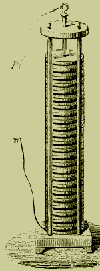 |
||
 |
||
Gallery
|
 Jean Antoine Watteau's "The Concert," 1716 |
|
|
 Giovanni Battista Tiepolo's Apollo Pursuing Daphne, 1765 |
 Voltaic pile, the first battery, 1799 |
|
|

Copyright © Irving Fang and Kristina Ross, 1995-1996. All rights reserved.